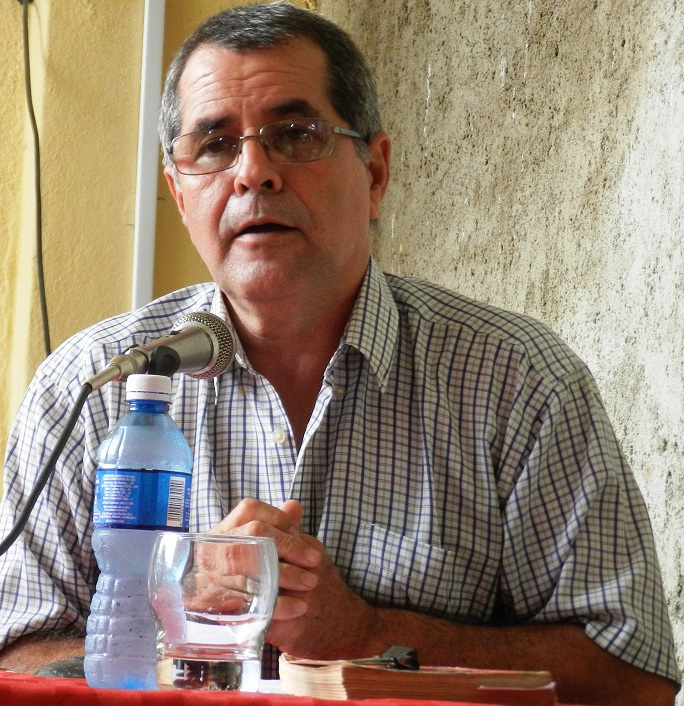CAMAGÜEY.- "The historian is a social scientist and he must be attentive to what people think," says Ricardo Muñoz Gutiérrez, president of the Union of Cuban Historians, the Camagüey's subsidiary. He considers his office to be central not only in the instruction of the inhabitants of this island, but also in the defense of our freedom and in the preservation of Cubanness, and we remember them on their day, July 1st.
The specialist says that the motivation for this subject came from “an uncle of mine who narrated dissimilar events to me at night. I was also encouraged by the classes I received in primary and secondary school, combined with the calls made by the country's leadership regarding the need to have teachers and to train teachers, led me in 1973 to join the Manuel Ascunce Domenech pedagogical detachment. There I joined the second contingent of Sola, in September 1973 ”.
During his student years, Muñoz Gutiérrez refers that they fulfilled “with a program where all the stories were taught and there was a professor graduated from the Universidad de Oriente, very capable, named Rafael Duarte, who really motivated me and my fellow classmates". Then, he pauses and reflects on the art of transmitting national events.
“In current times, historians must understand what event we want to bring to the citizen. It is our mission to prevent what happened in the past from being diluted in time. Whoever knew a society characterized by multiple, very marked inequalities, does not think the same as the most current generations ”.
Ricardo assures that to instruct both his subject, as in any other, the teacher needs to master the content of his class. "From what is well known, well spoken, as our National Hero, José Martí, said, and internalizing the information that will be communicated in front of a classroom is essential." Professional mastery is acquired step by step, over the years.
On the need to make the glorious pages ours, he elaborated: “all states must develop in their people a form of constructive nationalism. And when those nations are in danger it is even more important to take care of that feeling and identification of their inhabitants. Since its emergence as a country, Cuba has been under threat. We have great examples of sacrifices for independence, first before Spain and then before the constant interference of the United States, which was always on the lookout ”.
The imperialist attitude of the US towards the Greater Antilles, says Muñoz, has been permeated by control. “In the early years there was neither communism, nor socialism, nor the great leaders of the Revolution. However, in the North American government they conspired and would always intervene against whatever hindered their interests, as happened with the Government of the Hundred Days. Against this, it is necessary to build a very solid historical memory. Trench political discourse has no place, but rather the clever way of making our past credible. That the individual feel the History of Cuba ”.
Ricardo, in addition to a vast experience as an educator, has developed successfully in the field of research. “In the year '84 I went to the José Martí Higher Pedagogical Institute to work as a teacher. However, investigative work is fundamental and during the 15 years that I worked in that center, I always tried to find a space for my research. There I was head of department and had a very limited time ”. He comments that one of the projects was carried out together with the prominent historian, Elda Cento, associated with the Marquis of Santa Lucía, Salvador Cisneros Betancourt.
“After 20 years of teaching, municipal history methodologist, pre-university deputy director, university and pedagogical professor, I came to the Office of the Historian of this City. On that site I have dedicated myself entirely to this activity and the results begin to emerge with the publication of books, articles and materials in digital media. The internationalist mission in Maputo, Mozambique in the year '83, as an educator, was fundamental in my life. There I was shocked to hear on Radio Luanda the parts of the Cuban government that narrated the criminal invasion of Granada by the North American government.
The story adapts to the needs of the moment and of the students. A teacher must touch the chord of the student, convince him and identify him with the social situation of his people. If he can't do it, the same thing happens to the person who tells a bad joke: nobody is amused ”.
Muñoz Gutiérrez states that a historian needs to “provide information on who was determined to be a patriot, but not force him to be like them. Through what they hear of that hero, people will be able to act according to their patterns ”. According to him, saving the memories of yesteryear is one of the forces that help us build our present and "illuminates the path we must walk."
- Translated by Linet Acuña Quilez



